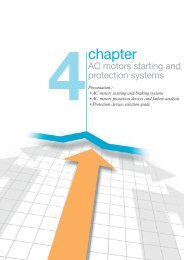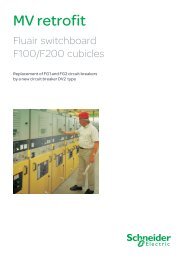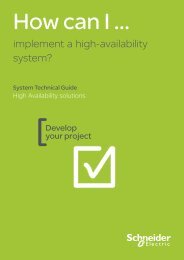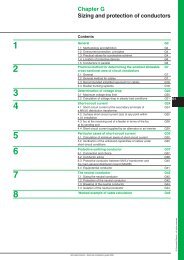Connect - Schneider Electric
Connect - Schneider Electric
Connect - Schneider Electric
You also want an ePaper? Increase the reach of your titles
YUMPU automatically turns print PDFs into web optimized ePapers that Google loves.
2 SUSTAINABLE DEVELOPMENT<br />
SCHNEIDER ELECTRIC, A RESPONSIBLE CORPORATE CITIZEN<br />
84<br />
electrical businesses through ADIE. <strong>Schneider</strong> <strong>Electric</strong>’s French<br />
sales division has also created a pact with dedicated technical<br />
training resources combined with support from a local sales<br />
representative to help these entrepreneurs.<br />
129 businesses received support in 2011.<br />
Investments internationally<br />
Two transactions were concluded as part of the SEEA international<br />
portfolio in 2011:<br />
• Kayer SARL a Senegalese company involved in the distribution<br />
of photovoltaic solar panels in rural areas. Its offering includes<br />
individual systems (SHS) as well as collective systems for<br />
supplying irrigation pumps or agricultural windmills;<br />
• Nice International. A company that manages networks of<br />
internet cafes using solar power systems. These internet access<br />
points allow users to access training, communication and<br />
information means. The SEEA investment alongside FMO (Dutch<br />
development aid funds) and Rabobank investments will allow the<br />
company to expand in Tanzania.<br />
Finally, discussions are under way for other partnerships in India<br />
and Africa.<br />
Offers and economic models for the base of<br />
the pyramid (Innovation)<br />
Innovation is refl ected in the design and implementation of rural<br />
electricity offers, products and solutions for disadvantaged groups.<br />
Approach<br />
Innovation for <strong>Schneider</strong> <strong>Electric</strong> starts with the local needs and the<br />
socio-economic context of those with little or no access to clean,<br />
healthy and reliable electricity. With this in mind, the chief aims of its<br />
offers and economic models are to:<br />
• respond to the energy needs of villages to support sustainable<br />
economic and social activity;<br />
• include and involve local populations in projects to guarantee<br />
their sustainability in the long term.<br />
<strong>Schneider</strong> <strong>Electric</strong> sets out to provide comprehensive energy access<br />
solutions that support revenue-generating entrepreneurial activities,<br />
foster community services or meet domestic needs. Products and<br />
solutions are developed to meet a range of both individual and<br />
community needs across the energy chain, from lighting systems<br />
and battery charging stations to decentralised small power plants<br />
and water pumping systems.<br />
Action plans<br />
Electrifi cation of villages in Nigeria and Senegal and a<br />
partnership with Grameen Shakti in Bangladesh<br />
In 2011, <strong>Schneider</strong> <strong>Electric</strong> established a partnership with the<br />
Grameen Shakti organisation based in Bangladesh. Through the<br />
partnership, <strong>Schneider</strong> <strong>Electric</strong> aims to supply lighting products and<br />
power control systems customised to demand for Grameen Shakti.<br />
<strong>Schneider</strong> <strong>Electric</strong> is currently strengthening this partnership<br />
through the rollout of training programs that are fully integrated into<br />
the BipBop plan.<br />
After Vietnam in 2010, four rural electrifi cation projects were<br />
successfully implemented in 2011.<br />
REGISTRATION DOCUMENT 2011 SCHNEIDER ELECTRIC<br />
The fi rst three projects in Senegal concerned the electrifi cation of<br />
three eco-villages situated around Dakar. They were implemented<br />
in partnership with the ANEV (National Eco-Villages Agency) and<br />
the company KAYER, a local installer with whom <strong>Schneider</strong> <strong>Electric</strong><br />
signed a partnership agreement in 2010.<br />
Another village electrifi cation was carried out in Nigeria in the Ogun<br />
province. <strong>Schneider</strong> <strong>Electric</strong> implemented an off-grid solar power<br />
station that powered community buildings and a battery charging<br />
station. This station is managed by a local entrepreneur who rents<br />
the batteries to individual homes on a daily basis.<br />
In India, <strong>Schneider</strong> <strong>Electric</strong> rolled out the same entrepreneurial<br />
battery charging business through selected volunteer entrepreneurs<br />
at the start of a basic electrician training program.<br />
Launch of a collaborative project<br />
The MiCST project consists of designing and manufacturing<br />
an innovative solar plant using sunlight to heat a thermal energy<br />
supply powering a thermodynamic machine coupled with a 10-kW<br />
alternator.<br />
The associated offer, named Microsol, will be designed to supply<br />
off-grid areas. MiCST is aimed in particular at developing countries<br />
with strong sunlight. Simple to install and maintain, it can be easily<br />
adopted by local populations. A major technical and technological<br />
challenge, it will take high-strength, low-cost and eco-design criteria<br />
into consideration.<br />
The project extends over 42 months and coordinates the expertise<br />
of 12 industrial and research partners. It is supported by the French<br />
Environment and Energy Management Agency (ADEME).<br />
Low-consumption lighting system<br />
In a program to extend access to energy, lighting is one of the<br />
fi rst vital needs expressed by population groups denied access or<br />
reliable access to electricity. Lighting makes it possible to study after<br />
the sun has gone down and to extend entrepreneurial activities into<br />
the evening. <strong>Schneider</strong> <strong>Electric</strong> developed In-Diya, an innovative<br />
and very low-cost domestic lighting system. With two types of lamp<br />
made up of 90 or 45 low-consumption LEDs (4.5W for 90 LED)<br />
that can be connected to a battery, which is in turn connected to a<br />
photovoltaic panel for charging.<br />
This new system is available practically everywhere in the<br />
world. Partnerships have been set up with local institutions and<br />
organisations to optimise deployment of the product and to target<br />
the poorest communities.<br />
The lamps are sold through our distribution networks, subsidiaries,<br />
a number of NGOs and businesses in the sector developing access<br />
to electricity.<br />
Training (People)<br />
Approach<br />
The key challenge of training in the electrical sector is to provide<br />
those at the “base of the pyramid” with the knowledge and skills to<br />
be able to carry out the task given to them in a safe and responsible<br />
way, as well as providing their families with the means for suitable<br />
subsistence.

















